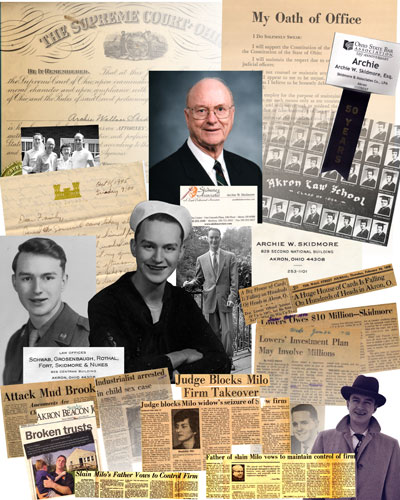Attorney Archie Skidmore Makes it 50 in the Practice of Law“I found out I passed the Ohio Bar Exam when I called in from my office at the Evans Savings and Loan where I worked in the mortgage loan department. When I found out that I had passed, I snuck out of my office to go celebrate with my classmates, not knowing that the bank had arranged to have a surprise party for me. It was such a well kept secret, that I didn’t know about the party and did not attend. My absence became a hot topic of discussion with the employees, who had no problem telling me what was on their mind upon my return the next day”, recalled Archie. Fifty years later on March 22, 2005, the Ohio State Bar Association honored Archie for having successfully completed 50 years in the practice of law. Unlike his absence from the party at the bank in 1955, this time Archie was in attendance. “It was nice to attend the recognition gathering . . . it was nice to see some of my old law school classmates after all those years”, said Archie. “At the time I became licensed in 1955, I could not envision that fifty years later, I would be accompanied by my three sons, also lawyers, commemorating my practice of law”, added Archie.
Archie attended night law school classes at the University of Akron, which in the mid-1950’s was located above a public drug store at the corner of Howard Street and Market Street. “When I was not studying the law, I was helping my folks run Skidmore Tavern located on Canton Road in Springfield, Ohio”, said Archie. While in his third year at law school, Archie worked as a Title Examiner at Summit Title Company and Lawyer’s Title Insurance Company where he became introduced to real estate law. Archie also worked in the real estate loan department at Evans Savings & Loan located at the corner of S. Main and Exchange Streets in Akron, Ohio. His experience at the Savings & Loan introduced him to other aspects of real estate law, such as banking and construction. After receiving his license in 1955, Archie opened a one-desk law office with attorneys Robert Blakemore, Max Rothal, Charles Church and George Danesis in the First National Tower. By the early 1960’s, Archie was dealing with complex aspects of real estate, construction and business transactions and litigation. Along with other co-parties, Archie conducted the trial work in the Yarborough Case (1960’s) that set the standard for decades for prioritizing mechanic’s liens and construction mortgages in Ohio. In the mid-1970’s, Archie became a partner in the firm of Schwab, Grosenbaugh, Rothal, Fort, Skidmore and Nukes, Inc. Archie was involved in the litigation that exposed the $11.2 million investment scheme of Donald Lowers. He was also involved in the liquidation of the Saalfield Publishing Company. In late 1970, Archie became a sole practitioner participating in numerous complex transactions and litigation. He was involved in multiple corporate civil lawsuits for control of the Milo Beauty and Barber Supply Company resulting from the murder of Constantine “Dean” Milo between 1981 – 1986. He helped reorganize Portage Machine Company under retired Cleveland Browns kicker, Jim Houston, resulting from the resignation of James D. Bell, II, who was forced to part as a result of criminal incongruities. Archie also represented Carter Jones Lumber Company, Brown-Graves Lumber Company and prominent local developer, Harold Garson. In the 1990’s, his law firm represented the entrepreneurial City of Akron in a number of complex construction real estate transactions and cases involving the BF Goodrich buildings (now known as the AES Building), Canal Square YMCA, Canal Park (the Akron Aeros), Quaker Square and the Akron Fulton Airport. When asked what his most favorite memory was as a lawyer, Archie stated as follows: “I was representing a lender pursuing a co-op grocery chain that was in litigation. After having two solid days of favorable testimony, I asked the owner of the chain what the lender had ever done to cause him any harm. The owner testified for 45 minutes; I objected to Judge William Baird, however, he overruled my objection and told me that anybody that would ask an open-ended question like that, deserved to hear the complete answer. The owner testified for an additional 45 minutes. I learned a valuable lesson in the art of cross-examination from a very honorable jurist!” |

